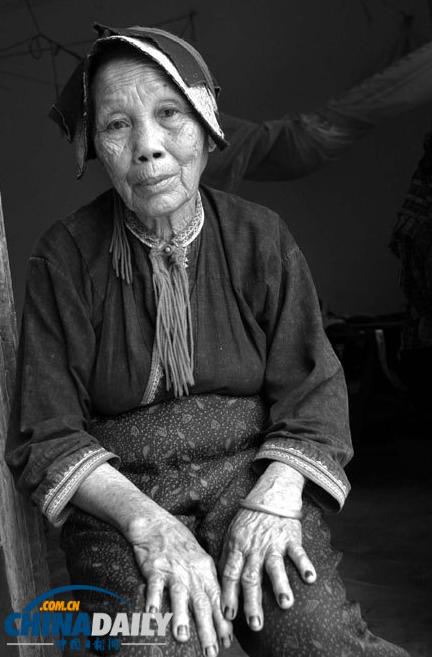
Deng Yumin was born in Shiqi Village, Baoting, Hainan Province, in 1926. Deng was raped by Japanese soldiers at the age of 16 and forced into sex slavery until the surrender of Japan in 1945. (File photo: China Daily/Chen Qinggang)
As the world is going to commemorate the 70th anniversary of the end of World War II this summer, a group of women, whose honor was barbarically trampled on by the Japanese army 70 years ago, are still fighting for their dignity, without knowing whether they can achieve this in their own lifetimes.
The women are known as "comfort women," an euphemism for those who were forcibly recruited as sex slaves by the Japanese Imperial Army before and during the war, to work in military brothels set up across areas occupied by Japan.
Historians estimate that about 200,000 women, mainly from the Korean Peninsula, China and other Southeast Asian countries occupied by Japan during WWII, were victimized by the Japanese inhumane brothel system, but now in South Korea, only 53 of them remain alive.
Kim Bok-dong, one of the 53 surviving South Korean "comfort women," recalled her immeasurable pain at a press conference here on Friday and called on the Japanese government under Prime Minister Shinzo Abe to admit Japan's wartime wrongdoings, offer an official apology to its victims and take the responsibility to resolve the "comfort women" issue.
Kim, 89, was coaxed from her home when she was just a 14-year- old girl. She was taken to a "comfort station," or military brothel, in Guangdong in south China and "moved" around many parts of Southeast Asia, including Singapore, Sumatra, Malaysia and Java, until the end of the war.
"I was told to make clothes in a factory for Japanese soldiers, " Kim said, "and not going was not an option, as my family would' ve been considered traitors. I had to go." She said that three men came for her the day she arrived in Guangdong, including a Japanese man in military uniforms.
Recounting her horrific experiences at the Foreign Correspondents' Club of Japan, she said that she believed she would be taken to a factory even when she arrived in Guangdong, but she finally realized this would never happen after she was subjected to a test for venereal diseases and assignation to a comfort station.
From one place to another, Kim said she and other "comfort women" were shifted around like luggage. "How could I say that my life was that of a human being," Kim said angrily and clearly aggrieved, adding that sometimes, particularly at weekends, there were long lines of men waiting outside her room for service.
Kim said the pain she experienced in those days was like dying a horrific death on a daily basis, but what she endured is attempted to be denied or whitewashed here by rightists who claim that "comfort women" were wartime prostitutes as they were well paid or they were volunteers to provide sex to the Japanese soldiers.
Such absurd and upsetting comments by some Japanese politicians have been strongly condemned and have been a major obstacle for Japan to repair its ties with the neighboring country.
However, Japan has tried to conceal this historical fact for 70 years. When Japan finally lost the war, Japanese soldiers, in a bid to hide the "comfort women" atrocity, took Kim and others to a military hospital in Singapore and provided them with nursing training so as to pass them off as nurses, according to the 89- year old.
It is feared that those survivors and their chance to tell their stories are now on borrowed time. Their voices are weakening as death creeps ever closer. For Kim, right now, she relies on medicine so that she can survive. She is clinically blind in one eye and the other needs medical treatment every day.
Besides physical impairments, they have also suffered mentally. "I can't find words to describe how I feel about my life. I'm almost 90. I don't know what love is. I married, but I couldn't have a baby. I have never been called 'mother,'" Kim said.
"What we want is something very simple. We want an official apology, reparation. I sacrificed my entire body that is now covered in wounds from those men. And I also demand Japan speaks the truth in front of the media," Kim said, adding that "I can not die now, I still have a purpose, I want my dignity and honor back. "
Yoon Mee-hyang, representative of the Korean Council for the Women Drafted for Military Sexual Slavery by Japan, said the " comfort women" victims have faced injustice for decades, as the war ended 70 years ago and the issue has been rumbling on unresolved for 25 years.
"What the Japanese government needs to do now is to listen to the voices of the victims and implement our requests," Yoon said at the same press conference.
Kim is not the only one who demands an apology from Japan. Lee Yong-soo, 86, another surviving South Korean "comfort women" also made the same demand in the United States on Thursday.
Kim and Lee both urged Abe, who will soon make a visit to the United States and address the U.S. congress, to apologize for the wartime barbarity committed by Japan.
"It is not Abe who did these wrongdoings, but the responsibility of the country's administration falls on Abe now. Therefore, the onus of responsibility lies squarely with him to recognize what Japan did in the past and to properly address the issue," said Kim.
















































